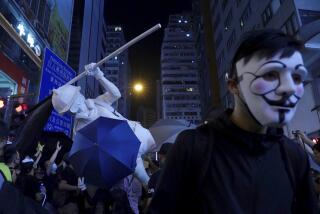China Trade Status Shift Could Jolt Hong Kong : Commerce: If Washington fails to renew the mainland’s most-favored-nation designation, the colony could lose billions in re-exporting income.
- Share via
To bystanders on the Pacific Rim--especially to Hong Kong--the battle between President Bush and Congress over China’s trade status has been like watching an accident happen in their own back yard. They see it as a threat to themselves and beyond their control.
Strictly speaking, the dispute is between Washington and Beijing.
But Hong Kong’s economy is so blended with China’s that U.S. termination of Beijing’s most-favored-nation trading privileges would cost the British Crown Colony up to $4.6 billion worth of business a year in re-exports from the mainland, Hong Kong officials say.
An estimated 32,000 to 43,000 Hong Kong jobs would be lost, they say. And they caution that disruption of U.S.-Sino trade would halve Hong Kong’s projected growth rate.
“Nobody can be more concerned than Hong Kong people about human rights in China, for in six years’ time we will become a special administrative region of China,” Baroness Lydia Dunn, chairwoman of the Hong Kong Trade Development Council and senior member of the Hong Kong Executive Council, said during a visit to Los Angeles last month.
“But we don’t see a working relationship with China as something you can simply turn on and turn off again every time China does something upsetting. I believe that you achieve much more influence over China by doing business with them on a steady and consistent basis.”
So alarmed was the Hong Kong establishment at the prospect of an end to trade benefits for China that it sent a high-powered delegation, including Dunn and William Purves, chairman of the Hong Kong & Shanghai Bank, to Washington last month to lobby Congress.
To assist, the delegation enlisted the support of Paul A. Volcker, former Federal Reserve chairman; William R. Rhodes, senior executive of Citibank; Ned Lautenbach, Asia Pacific president of IBM World Trade Corp.; Alex M. Mandl, chairman and chief executive of Sea-Land Services Inc.; James Miscoll, vice chairman of Bank of America; John L. Moore, senior vice president of Bechtel; Richard R. Albrecht, executive vice president of Boeing Commercial Airplanes Co., and David A. Miller, president of Toy Manufacturers of America Inc.
All of them presented to Congress views supporting Hong Kong’s plea to retain most-favored-nation status for China. Hong Kong isn’t alone in its stance.
But the Senate recently joined the House in voting to impose tough conditions on renewal of China’s trade status, requiring China to account for and release prisoners arrested during the Tian An Men Square protests, to stop exporting products to the United States made by forced labor and to stop aiding Cuba and the Khmer Rouge in Cambodia.
The Senate vote, however, was not sufficient to override President Bush’s expected veto.
“Nobody (in Asia) wants to see the U.S.-China relationship break down or go back to the way it was (before most-favored-nation trade preference was extended in 1980),” said Charles Morrison, head of the International Relations Program at Honolulu’s East-West Center.
“If things stay as reasonably warm as they have been, everyone benefits,” Morrison added. “People like the idea of China participating as a member of the region, and not everybody has a taste for the Americans trying to impose their view of human rights on China.”
Japanese companies display little concern. Kazuaki Yasuda, a spokesman for the Japan-China Assn. for Economy and Trade, said in Tokyo that if U.S.-Sino trade breaks down, few Japanese companies will suffer because “Chinese exports to the United States from Japanese subsidiaries in China are not so significant.”
On the whole, Yasuda said, Japanese firms assume that the United States will extend most-favored-nation trade preference “in consideration of the interests of American business in China.”
Times Tokyo correspondent Sam Jameson contributed to this story.
More to Read
Sign up for Essential California
The most important California stories and recommendations in your inbox every morning.
You may occasionally receive promotional content from the Los Angeles Times.










